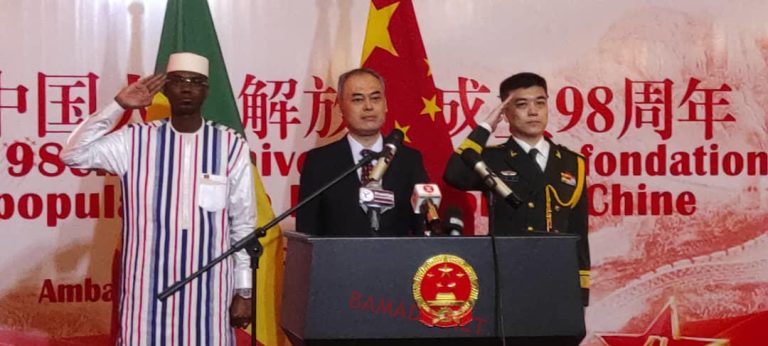
In a powerful display of diplomatic unity and strategic alliance, the Chinese Embassy in Mali hosted a formal reception on July 22, 2025, to commemorate the 98th anniversary of the founding of the People’s Liberation Army (PLA) of China.
The event, held in Bamako, drew high-level Malian officials including General Sadio Camara, Minister of Defence and Veterans Affairs, and Medical Colonel Assa Badiallo Touré, Minister of Health and Social Development.
The gathering highlighted not only the symbolic importance of China’s military legacy but also the expanding depth of bilateral cooperation between Mali and China.
Founded on 1 August 1927, the PLA has grown into one of the largest military forces in the world and stands as a central pillar of China’s geopolitical ascent.
The 98th anniversary served a dual purpose in Mali — honouring a historic Chinese milestone while reinforcing Beijing’s global ambitions amid rising international uncertainties and security challenges.
In their remarks, Chargé d’Affaires Liu Kaiyuan and Defence Attaché Xu Tie emphasized the PLA’s remarkable evolution into a modern, professional force driven by technology and strategic discipline.
They reflected on painful historical lessons — notably the resistance against Japanese aggression — to champion a modern doctrine centered on peace, multilateralism, and international cooperation.
Far from a ceremonial gesture, the reception spotlighted China’s enduring military partnership with Mali, which dates back to the 1970s. Over the decades, China has trained hundreds of Malian officers, dispatched military experts to Bamako, and supported the capacity-building of the Malian Armed Forces (FAMa).
This quiet but persistent collaboration illustrates a model of South-South solidarity outside traditional Western aid frameworks.
The Chinese Defence Attaché reiterated China’s adherence to a non-interference policy, underscoring Beijing’s respect for national sovereignty and regional stability. “More than a military alliance, China’s support to Mali is grounded in mutual respect and strategic trust,” he noted.
The year 2025 also marks the 65th anniversary of diplomatic relations between China and Mali — a friendship that began during the era of African independence and has weathered political transitions and global upheavals.
Liu Kaiyuan’s address outlined the shift towards a comprehensive strategic partnership, as cemented during the 2024 China-Africa Summit.
Presidents Assimi Goïta and Xi Jinping previously pledged to deepen bilateral cooperation across political, economic, and military domains.
Recent Chinese support includes tariff exemptions on Malian goods, significant investments in infrastructure, and growing Chinese presence in Mali’s mining, energy, and agriculture sectors.
In this light, the PLA anniversary was more than a military celebration; it was a clear diplomatic statement.
It showcased a shared vision for development, sovereignty, and peace — not only between Mali and China but across the African continent, where Beijing’s alternative model of cooperation continues to gain traction.
As military leaders, diplomats, experts, and the Chinese community gathered in Bamako, the event became a symbolic tableau of a world in flux — one in which China and Mali appear poised to shape new strategic balances together.



